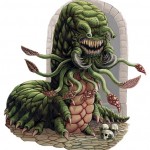 When you conjure up memories of your favorite stories – in books, movies or in your RPG campaigns – what’s often the first thing you remember? If you thought or mouthed “the characters,” then read on. And if you didn’t for some wild yet almost assuredly creative reason, read on anyway because it’s worth it!
When you conjure up memories of your favorite stories – in books, movies or in your RPG campaigns – what’s often the first thing you remember? If you thought or mouthed “the characters,” then read on. And if you didn’t for some wild yet almost assuredly creative reason, read on anyway because it’s worth it!
Atmosphere is defined as “the dominant mood or emotional tone of a work of art, as of a play or novel: the chilly atmosphere of a ghost story” – for our purposes, this literary definition serves us best. Now I’m not going to fire us all back to English class (and oh how I honestly miss those halcyon days), but I do want to emphasize the importance of the connection between atmosphere and the cast of characters in your roleplaying games.

Just look at the in-context example of atmosphere’s definition. The mere presence of a ghost indicates characters, and likely human characters with all sorts of very real and identifiable human emotions. Strong ones like fear, hate and love – the latter usually buried deep in the story somewhere, somehow, preferably as convoluted or tragic as possible – are common in ghost stories. Certainly other important elements help create atmosphere (music, descriptive language, etc.), yet characters create and drive the lion’s share of mood and atmosphere in a story. If the character is shallow, boring, or we simply don’t know much about him or her, or the actor is terrible, they’ve lost you before you also realize how bad the background music, plot or dialogue is. Read the rest of this entry »
![]() Where in the blogosphere do you go to think, read and talk D&D?
Where in the blogosphere do you go to think, read and talk D&D? 
